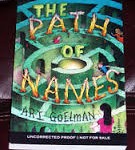
Thirteen year old Dahlia has a summer camp experience like no other.
As part of a bargaining agreement with her parents, she must attend Camp Arava for two weeks. In trade she will then get to go to magic camp at the end of summer. Dahlia wants more than anything to improve her magic skills, so she accepts the deal. From the moment she arrives at Camp Arava unusual things begin to happen. She sees ghost children and she suddenly has inexplicably mad skills for understanding Hebrew. She begins to have visions and dreams of a man that lived seventy years ago. And then there’s the hedge maze; off limits and overgrown, but so enticing.
As the plot thickens so do the supernatural occurrences. A book of Kabala that mysteriously keeps finding its way back into Dahlia’s possesion, voices from the dead and a golem play key roles in unraveling this tale of mystery, spirituality, mysticism and adventure.
The author, Ari Goelman, has created a novel that fills a niche. Religion, mystery and adventure is a combination that is not often seen in children’s books. A component of the story revolves around spirituality and Kabala (Jewish mysticism) but Goelman handles the topic with finesse. He does not overwhelm the reader with in-depth information about the subject. He gives just enough information for a novice to understand and be engaged. Goelman deftly weaves several story lines into one engaging tale.
I found myself caring for the characters and was left wanting more when the story ended. This story might appeal to children who like mysteries, ghost stories, adventure or spirituality. The story is strong enough that if a child did not care for one aspect, it would not be enough to make them walk away. I feel this story could have a wider audience if certain items had not been included. I believe upper elementary students could have enjoyed this book if the following was left out:
In the girls cabin, the girls were to choose between a song or a story, but they wanted “S.O.S.” (sessions on sex). It was quickly overruled by a counselor in training. (p.173) This brief episode added nothing to the story, seemed a bit forced and could easily have been left out.
When a girl gets disturbed while sleeping she blurts out an expletive that some my find offensive. (p. 237)
These two items may seem minor, but when I consider my community’s culture I know this would not be a good choice as it stands. It is a shame too, because this well written, layered tale is one that upper elementary would also enjoy.




